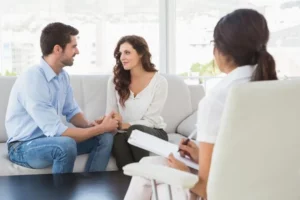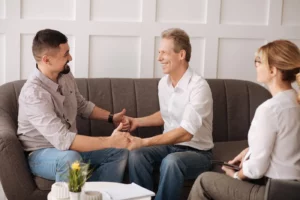Communication is the foundation of any successful relationship, and this holds especially true for couples. However, as life gets busier and external stressors take their toll, communication between partners can suffer, leading to misunderstandings, conflicts, and a strain on the relationship. This is where communication therapy for couples comes into play. In this comprehensive guide, we will explore the significance of communication therapy and how it can help couples build stronger bonds.
Contents
What Is Communication Therapy For Couples?
 The primary goal of communication therapy is to enhance the way couples communicate with each other. It involves identifying and addressing problematic communication patterns, such as frequent arguments, misunderstandings, or ineffective ways of expressing needs and emotions. The therapy sessions aim to teach couples healthier and more constructive ways of interacting, and fostering.
The primary goal of communication therapy is to enhance the way couples communicate with each other. It involves identifying and addressing problematic communication patterns, such as frequent arguments, misunderstandings, or ineffective ways of expressing needs and emotions. The therapy sessions aim to teach couples healthier and more constructive ways of interacting, and fostering.
During communication therapy, couples learn to identify and break negative communication cycles, which often involve patterns of criticism, defensiveness, contempt, and stonewalling. The therapist helps couples understand the underlying dynamics of their communication difficulties and offers practical strategies and tools to improve their interactions.
During communication therapy, couples learn to identify and break negative communication cycles, which often involve patterns of criticism, defensiveness, contempt, and stonewalling. The therapist helps couples understand the underlying dynamics of their communication difficulties and offers practical strategies and tools to improve their interactions.
How Does Communication Therapy Work?
 Communication therapy works by providing couples with a structured and supportive environment in which they can address their communication issues and work towards healthier and more effective ways of interacting.
Communication therapy works by providing couples with a structured and supportive environment in which they can address their communication issues and work towards healthier and more effective ways of interacting.
Here’s an overview of how communication therapy typically works:
- Initial Assessment: The therapy process usually begins with an initial assessment session, where the therapist meets with the couple to gather information about their relationship, communication challenges, and goals for therapy. This assessment helps the therapist understand the specific issues at hand and tailor the therapy approach accordingly.
- Identifying Communication Patterns: The therapist helps the couple identify their current communication patterns and dynamics. This involves exploring how they talk to each other, how they listen, and how they handle conflicts. By recognizing these patterns, couples gain insight into the problematic areas of their communication and the negative cycles they may be trapped in.
- Establishing Therapy Goals: Based on the couple’s assessment and their desired outcomes, the therapist collaborates with them to establish therapy goals. These goals can range from improving communication skills, resolving specific conflicts, rebuilding trust, enhancing emotional intimacy, or strengthening overall relationship satisfaction.
- Breaking Negative Communication Cycles: The therapist helps couples identify and break negative communication cycles that contribute to conflict and misunderstanding. This involves recognizing unhelpful patterns, such as criticism, defensiveness, contempt, or stonewalling, and learning alternative ways to respond. Couples are guided in developing new habits and behaviors that promote healthier communication.
- Emotional Exploration and Support: Communication therapy often involves exploring deeper emotional issues that may be affecting the couple’s communication. The therapist helps couples navigate underlying factors such as past traumas, trust issues, or differing values. Emotional support is provided to create a safe space where partners can express their vulnerabilities, fears, and hopes.
Overall, communication therapy helps couples develop effective communication skills, understand each other better, and create a more fulfilling and harmonious relationship. It provides a structured and supportive space where couples can work through their communication difficulties, resolve conflicts, and build stronger connections.
The Advantages Of Communication Therapy
 Communication therapy for couples offers several benefits that can positively impact their relationship.
Communication therapy for couples offers several benefits that can positively impact their relationship.
Here are some key benefits of communication therapy:
- Conflict Resolution: Couples often face conflicts in their relationship, and communication therapy provides a platform to address and resolve these conflicts. The therapist guides couples in constructive dialogue, teaching them problem-solving techniques and negotiation skills. This helps couples find mutually satisfying resolutions and reduces the likelihood of repetitive arguments.
- Enhanced Emotional Familiarity: By fostering open and honest communication, therapy strengthens emotional intimacy between partners. Couples learn to express their needs, desires, and vulnerabilities in a safe and supportive environment, deepening their connection and understanding of each other.
- Strengthened Connection and Trust: Communication therapy helps couples rebuild or strengthen their connection and trust. Through improved communication, partners can express their concerns and needs, and feel heard and validated by their partner. This fosters a sense of safety and builds trust within the relationship.
- Increased Relationship Satisfaction: Effective communication is a key factor in relationship satisfaction. By addressing communication challenges, therapy enhances overall relationship satisfaction for couples. They experience greater harmony, understanding, and fulfillment in their partnership.
- Prevention of Escalating Issues: Communication therapy can be beneficial even before major issues arise. It provides an opportunity for couples to proactively address minor communication difficulties or misunderstandings, preventing them from escalating into more significant problems down the line.
- Enhanced Problem-Solving Skills: Communication therapy equips couples with problem-solving skills that extend beyond communication challenges. These skills can be applied to various areas of the relationship and other aspects of life, fostering healthier decision-making and cooperation.
How To Find a Qualified Communication Therapist?
 Finding a qualified communication therapist for couples can greatly contribute to the effectiveness and success of therapy.
Finding a qualified communication therapist for couples can greatly contribute to the effectiveness and success of therapy.
Here are some steps you can take to find a qualified communication therapist:
- Research Credentials and Specializations: Look for therapists who specialize in couples therapy or marriage counseling. Review their credentials, such as their educational background, training, and certifications. It’s essential to find a therapist who has specific expertise in communication therapy for couples.
- Check Licensing and Accreditation: Ensure that the therapist is licensed to practice in your region or country. Licensing requirements may vary, so it’s important to verify their credentials. Additionally, consider therapists who are affiliated with reputable professional organizations or have relevant certifications.
- Assess Experience and Expertise: Inquire about the therapist’s experience working specifically with couples and addressing communication issues. Ask about their therapeutic approach and techniques used in communication therapy.
- Consider Compatibility and Rapport: Building a strong rapport with your therapist is important for the success of therapy. During the initial consultation, assess whether you feel comfortable and understood by the therapist. Trust your instincts and choose someone with whom you and your partner feel a connection.
- Consult with Insurance Providers: If you have health insurance that covers therapy, consult with your insurance provider to understand your coverage and reimbursement options. This can help narrow down your search to therapists who accept your insurance.
- Consider Online Options: With the rise of teletherapy, you may have access to qualified communication therapists who offer online sessions. This can increase your options and flexibility in finding a suitable therapist.
Remember, finding the right communication therapist may require some research and exploration. It’s essential to find a qualified professional who resonates with you and your partner, creating a safe and supportive environment for your communication therapy journey.
What To Expect During A Communication Therapy Session?
 During a communication therapy session, couples can expect a structured and supportive environment. Where they work with a qualified therapist to address their communication challenges and improve their relationship.
During a communication therapy session, couples can expect a structured and supportive environment. Where they work with a qualified therapist to address their communication challenges and improve their relationship.
Here’s what you can generally expect during a communication therapy session:
- Setting the Agenda: At the beginning of each session, the therapist will typically ask couples to share the topics or issues they would like to discuss. This helps set the agenda and ensures that the session focuses on the most relevant and pressing concerns.
- Open Conversation: The therapist facilitates open dialogue between partners, allowing each person to express their thoughts, feelings, and perspectives on the identified issues. The therapist encourages active listening and ensures that both partners have an opportunity to speak and be heard.
- Exploration of Communication Patterns: The therapist helps couples identify and explore their existing communication patterns and dynamics. This may involve discussing how they communicate, their typical responses during conflicts, and any recurring negative cycles that may be present.
- Skill-Building Exercises: Communication therapy often involves various skill-building exercises. The therapist introduces techniques and strategies for effective communication, such as active listening, using “I” statements, and practicing empathy. Couples are encouraged to actively engage in these exercises during the session.
- Identifying and Challenging Unhelpful Patterns: The therapist helps couples recognize unhelpful patterns. That contributes to communication difficulties, such as criticism, defensiveness, contempt, or stonewalling. Couples are guided in challenging and modifying these patterns to promote healthier communication and connection.
- Emotional Exploration: Communication therapy may involve exploring deeper emotional issues. That impacts communication, such as past traumas, trust issues, or underlying emotions. The therapist creates a safe space for couples to express their emotions. While providing support and guidance in navigating these sensitive topics.
Conclusion
Communication therapy for couples plays a vital role in fostering healthier and more fulfilling relationships. By focusing on effective communication techniques, conflict resolution strategies. Along with, emotional connection, couples can build stronger bonds, enhance intimacy, and navigate challenges together. Investing in communication therapy is an investment in the long-term success and happiness of your relationship. Remember, communication is the cornerstone of any successful relationship. So, take the first step towards building a stronger connection with your partner through communication therapy.
Addressing and resolving couple of issues is essential for a strong and lasting partnership. If you have any queries regarding Online Couple Counseling experienced therapists at CoupleMantra can help. Book a trial couple therapy session


